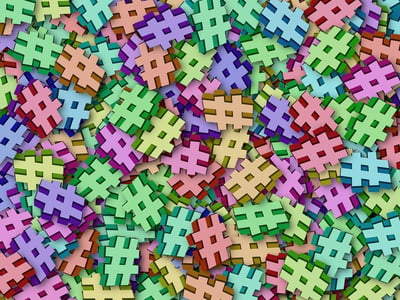In 2007, when the pound sign was first used by Chris Messina as a metadata tag to find topics of interest with ease, no one could have predicted hashtags would have become extremely popular among social media users around the globe.
Just in two years, Twitter adopted the use of hashtags into its code, turning the concept of hashtag marketing into a viable marketing tactic. Later, various social media platforms like Facebook, Instagram, Youtube, Reddit, Tumblr, and Pinterest supported the idea of using hashtags. Today, 75% of social media users share posts with hashtags daily.
The popularity of hashtags is on its rise. Since social media posts may go viral these days, it's no wonder that hashtags have become an important part of Internet activism, enabling faster and more effective communication.
We're now talking about hashtag activism, the act of showing support for a cause through a like or share. No matter what digital activism objectives you want to achieve, whether you want to raise awareness, cause mobilization or encourage action, hashtag activism is here to help.
First things first: let’s define the term.
Hashtag activism is the act of building up public support through social media channels (Twitter, Facebook, Instagram, etc.) with the help of relevant hashtags.
In other words, hashtag activism allows people or organizations to spark a widespread discussion through social media, whether they want to fight for or support a cause. Since information spreads fast on social media, many people believe that hashtag activism is an effective form of advocacy and that's true.
Over the last few years, hashtag movements have seen wide international coverage: #MeToo, #NeverAgain, and #BlackLivesMatter, to name a few.
In fact, there are different types of hashtag activism, usually in the form of supporting a cause or marginalized group of people:
When done right, hashtag activism campaigns help to achieve various goals. Before taking a look at the examples, let’s learn more about the history of this concept.
With the growing popularity of social media, when 3.6 billion people use social media worldwide, it’s no wonder that social media platforms have become a powerful communication channel.
Today, not only can users get in touch with friends and family, but they can also use social media to build up public support or fight for a cause or issue. This is how the idea of social media activism appears.
The history of social media activism dates back to 2004, when Facebook appeared. The growing popularity of Facebook and the launch of YouTube (2005) and Twitter (2006) also helped every user voice their opinions and beliefs with ease. It allowed activists to organize political and social movements globally and spread the word fast.
Later, the hashtag helped users to organize conversations. Back in 2007, Chris Messina posted the first post with a hashtag and offered users to use hashtags to gather discussions. He also outlined some of the hashtag features. Twitter liked the idea of using hashtags, so the company made hashtags clickable in 2009 which helped to tag and structure relevant content.
Today, hashtags play a key role in social media activism, so it’s no wonder that the term ‘social media activism’ is often used interchangeably with hashtag activism.
For hashtag activists, it’s enough to ‘like’ or ‘share’ post or ‘retweet’ tweets on Twitter. This means it doesn’t take much time or effort to participate in hashtag activism, so the popularity of this concept is growing. Over the last years, the concept has seen massive support and there are different effective brand hashtag campaigns that go viral.
Today, we’re going to take a look at the most impactful social media activism campaigns, how they rolled out, the impact, and more.
If you’re an active social media user, it’s more likely you’ve seen hashtag campaigns like #MeToo, #NeverAgain and #BlackLivesMatter. To inspire your next hashtag activism campaign, we’ve collected top 10 online activism examples of recent years.
One of the most impactful activism campaigns is the #BlackLivesMatter movement. The history of this movement started back in July 2013 when Alicia Garza used the hashtag #BlackLivesMatter on her Facebook account. It was the response to the acquittal of George Michael Zimmerman who shot Trayvon Martin, a 17-year-old African-American high school student, on February 26, 2012. This hashtag evolved into a movement and slogan rapidly.
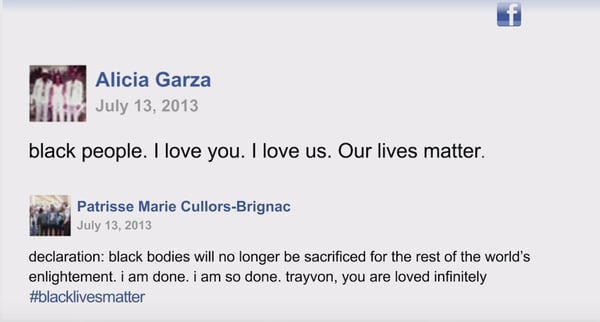
The Black Lives Matter (BLM) movement has become a protest against police brutality and all racial violence against African-American people. It has gained national attention and it has quickly become popular around the globe. What is more, the American Dialect Society claimed that #BlackLivesMatter was the word of 2014.
Today, Black Lives Matter is an organization that unites people worldwide who want to fight for freedom, liberation, and justice. The organization raises awareness and encourages people to share the hashtag on social media and/or donate to BLM.
In 2020, Black Lives Matter movement peaked on June 6, when half a million people took part in protests in more than 550 places across the United States. This movement has gained in popularity. According to New York Times, #BlackLivesMatter is predicted to be the largest movement in U.S. history.
Millions of social media posts include a #BlackLivesMatter hashtag. For example, there are over 23.5 million posts under this hashtag on Instagram.
Another great example of hashtag activism is the #BringBackOurGirls campaign. It appeared in April 2014, when the terrorist group Boko Haram kidnapped 276 female students from the Government Girls Secondary School in Chibok, Nigeria.
Former first lady Michelle Obama posted a tweet with this hashtag to draw international attention to the story.
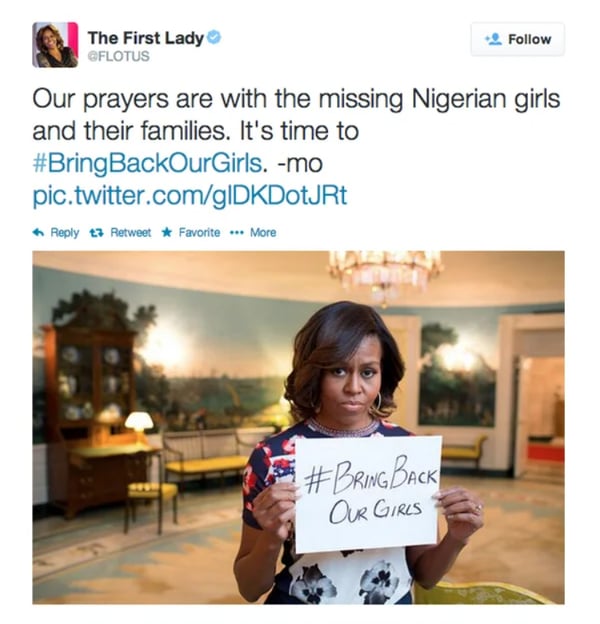
The movement offered a $300,000 cash reward to anyone who could help locate or rescue the kidnapped girls. Many celebrities supported the movement and uploaded photos of themselves with the hashtag #BringBackOurGirls.
Some of these influencers include Justin Timberlake, Salma Hayek, Demi Moore, Sylvester Stallone, Bradley Cooper, Antonio Banderas, and Anne Hathaway. This movement raised human rights awareness in people around the globe.
The hashtag has received two million retweets. As a result of this campaign, 57 of the schoolgirls were rescued in the next few months. Over the last six years, 102 more girls escaped. However, 112 girls are still missing at time of writing.
As specified in the UnWomen report, 35% of women worldwide have experienced physical or mental violence at least once in a lifetime. In the last few decades, the idea of gender equality has seen massive support as it allows people to prevent violence against women and girls.
Thus, it's no wonder that the United Nations initiated a solidarity movement for the advancement of gender equality, better known as #HeForShe, in 2014. The organization invited Emma Watson who became UN Women Global Goodwill Ambassador and spread the word about the problem.
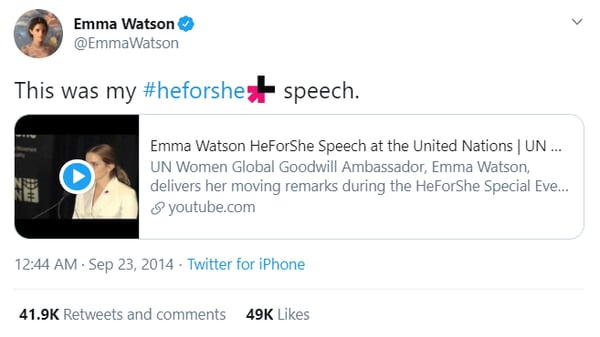
More and more people join the movement to support women around the globe. Luckily, the number of web commitments is constantly growing. At HeForShe’s website, you can take a look at the numbers, just like in the screenshot below:
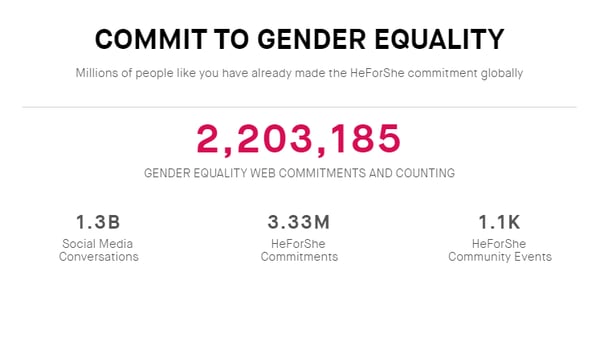
Most hashtag activism campaigns aim at raising awareness. For example, #IceBucketChallenge, also known as the ALS Ice Bucket Challenge, helped to promote awareness of the disease amyotrophic lateral sclerosis (ALS) and raise donations to research in 2014.
It was an activity when a participant should have dumped a bucket of ice water over his or her head, either by another person or self-administered. Then, the person had to nominate others to do the same within 24 hours and upload a video or donate to the ALS Association. It was extremely popular among social media users in July-August, 2014.
Not only did common people take part in the competition, but also politicians, sportsmen, and celebrities did it. Here's an example of the #IceBucketChallenge video from Oprah Winfrey.
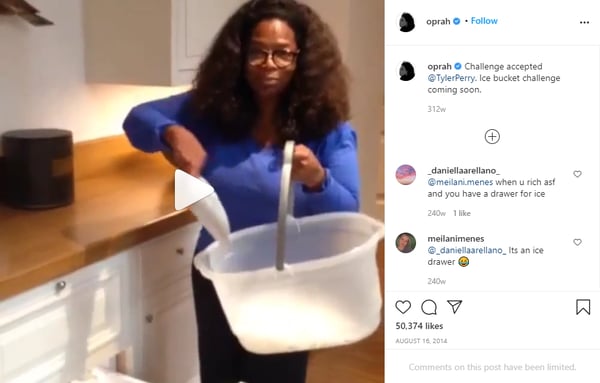
The campaign got tremendous results. One report said that people shared more than 1.2 million videos on Facebook and mentioned the campaign more than 2.2 million times on Twitter. What is more, #IceBucketChallenge helped to raise over $220M worldwide for the disease in one year. Not bad, huh?
In 2015, when April Reign saw the Oscar nominations, she created the #OscarsSoWhite hashtag to bring the attention of the Academy of Motion Picture Arts and Sciences about the lack of diversity.

Other fans joined the movement and they wanted to hear back from the organization. According to GetVoIP research, 52% of people expect resolution within a day via social media, 53% of people who reach out to an organization on Twitter expect a response within an hour and that number jumps to 78% if they’re making a complaint.
The organization didn't comment on the movement, but it gave results anyway. When April Reign created the hashtag to bring attention to the issue, the Academy membership was 92% white and 75% male. The numbers had improved since then as the membership was 84% white and 68% male in 2020.
Another anti-racism hashtag activism movement #TakeAKnee was adopted by Colin Kaepernick on August 26, 2016. He took a knee during the national anthem to protest against incidents of police brutality against black Americans. Other teammates also joined the protest by “taking a knee” during the anthem.
Two days later, Kaepernick gave a press conference and explained his actions. Also known as the U.S. National Anthem Protest, the #TakeAKnee movement gained in popularity when other athletes were inspired to take a knee.
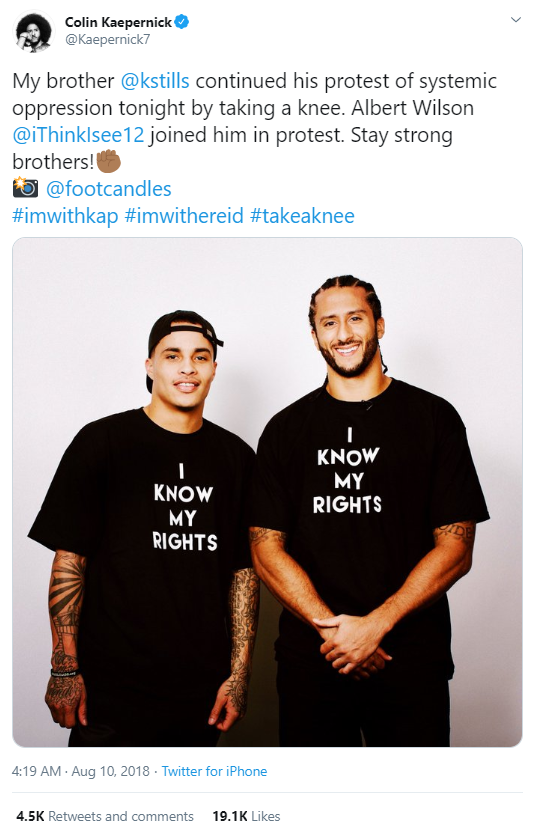
Later, people from all over the globe and international brands supported the movement. In 2018, Nike launched its new ad with Kaepernick as the head of the campaign. For now, Kaepernick is still the biggest key actor behind this movement and he posts motivational Tweets to bring attention to the problem.
Whether you're male or female, it's more likely you know about the #MeToo movement as it needs no introduction. It's a popular social movement against sexual harassment and sexual abuse that first appeared in 2007.
The hashtag #MeToo was created by sexual harassment survivor Tarana Burke in 2007, but it went viral 10 years later. The story dates back to the early October 2017, when a dozen women accused Harvey Weinstein of exual-abuse allegations.
Different female film industry stars shared similar experiences with Weinstein and Milano was the first one to voice it. Milano posted a Tweet on October 15, 2017 and that hashtag had been used more than 200,000 times by the end of the day.
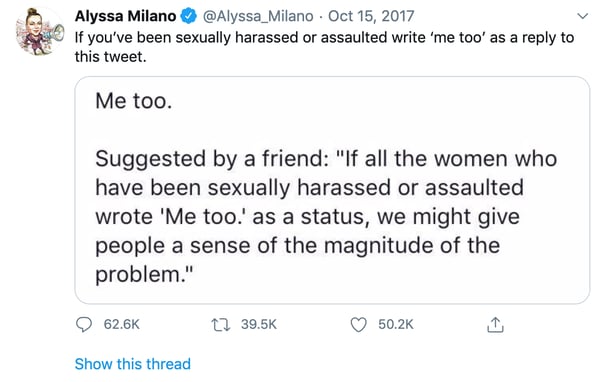
The campaign brought the issue into public awareness and it got massive support. One research claimed that #MeToo-related posts got 7.28x more likes and 3.37x more retweets. As a result of this campaign, at least 201 powerful men lost jobs or major positions.
The #NeverAgain movement appeared in 2018 when American student-led political action used that hashtag to advocate for tighter regulations in order to prevent gun violence. They were witnesses of one gun violence issue that happened in their school. On February 14, 2018, a 19-year-old former student killed 17 people and injured 17 others in Parkland, Florida.
According to one report, eight children die from gun violence daily and 32 more children are shot or injured. Since American children suffer from gun violence each day, organizators wanted to raise awareness of the problem.
The organizators also created a national demonstration known as the March for Our Lives that took place on March 24, 2018. The #NeverAgain movement is a good start for the anti-gun violence action.
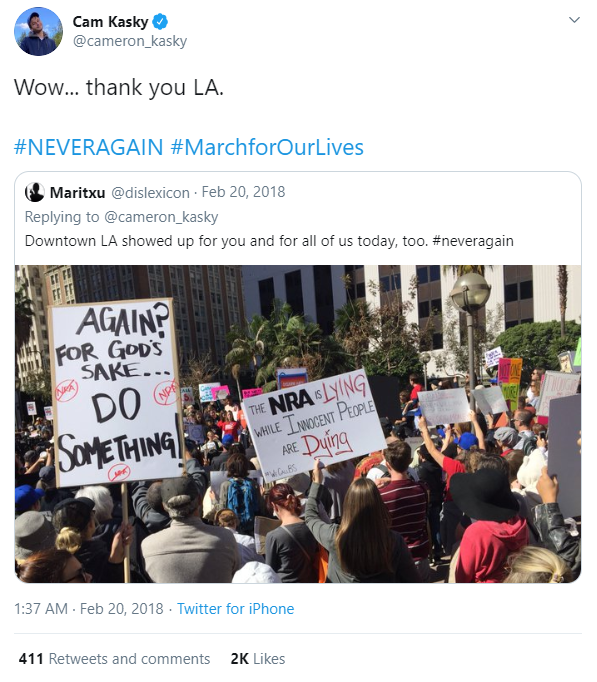
The outbreak of COVID-19 has changed the lives of people worldwide. #Coronavirus is the most discussed topic of 2020 and the number of posts with this hashtag is constantly growing.
Back in December 2019, people started using this hashtag to monitor the situation in China but it gained popularity in March 2020. When COVID-19 affected most countries worldwide, hashtag quickly became trendy on social media platforms like Twitter.
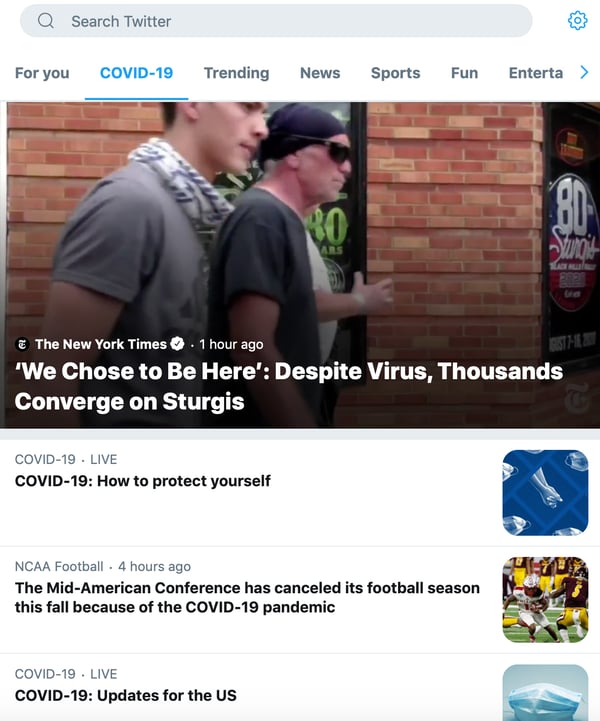
For now, there are over 600 million tweets about coronavirus and COVID-19, 5.3 million Facebook users are talking about it, and almost 30 million posts on Instagram with this hashtag.
One of the latest hashtag activism movements is dedicated to the princess of pop, Britney Spears. It's no secret that the pop star has mental health problems so an 38-years old celebrity has been under her father’s guardianship since 2008.
According to the conservatorship, Britney is not allowed to drive a car, get married, make calls, and even publish social media posts as her accounts are presumably monitored,the absolute invasion of the digital privacy rights. Notably, Spears still creates music and takes world tours, making money for her guardian as she can't look after her $59 million fortune.
#FreeBritney hashtag appeared in 2019, but it went viral when Britney started posting videos to her Tik Tok account. Her fans believe that Spears has been sending coded messages through social media, so they have united to help Britney Spears and they use the hashtag #FreeBritney that is trending on social media platforms.
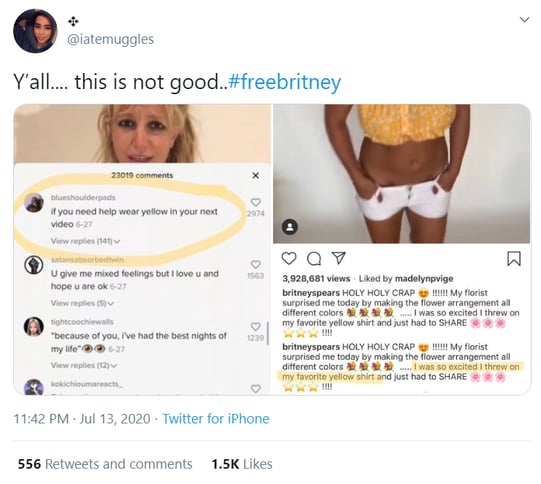
On August 3, Jamie Lynn Spears commented on the #FreeBritney movement and he called the supporters “conspiracy theorists”. However, fans are still active on social media as Spears' 12-year conservatorship case was extended to August 22 or “the conclusion of the pandemic.”
Modern social media users ‘like’ and ‘share’ content to give their followers a better sense of what they care about and therefore stay connected to people. Living in the digital age, it’s easy for people to become an activist for causes and issues they believe in. The popularity of the above-mentioned campaigns proves the power of hashtag activism.
The bottom line? With the right hashtags, it's easy for activists to tag relevant content and cut through the noise which helps to raise awareness of social issues and involve interested social media users in mass movement and protest.
Hashtag marketing is a relatively new term.
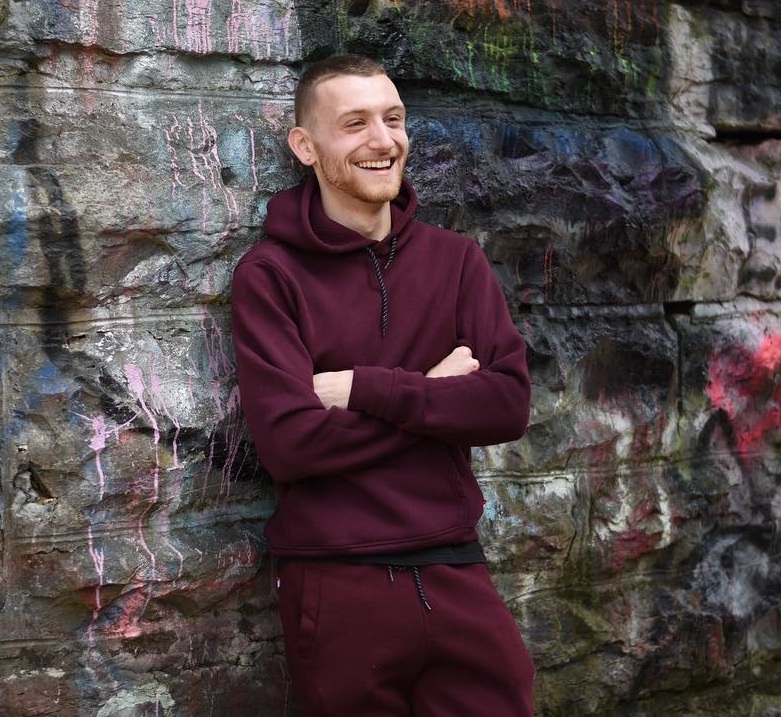 by Frank Hamilton
by Frank Hamilton
Trending content isn't difficult to come by these days – if you know where to look for it.
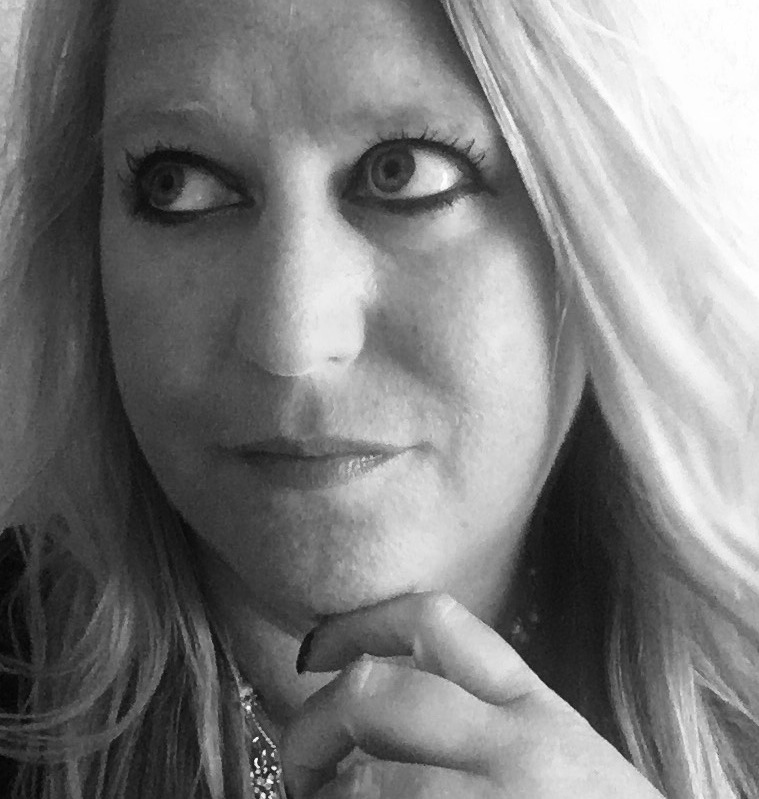 by Angela Ash
by Angela Ash
The rate of change in the business world is mind-boggling.
.jpeg) by Matt Kunkel
by Matt Kunkel
Hashtag marketing is a relatively new term.
 by Frank Hamilton
by Frank Hamilton
Trending content isn't difficult to come by these days – if you know where to look for it.
 by Angela Ash
by Angela Ash
